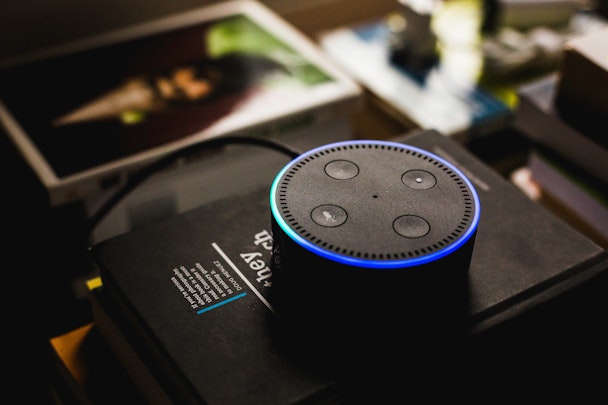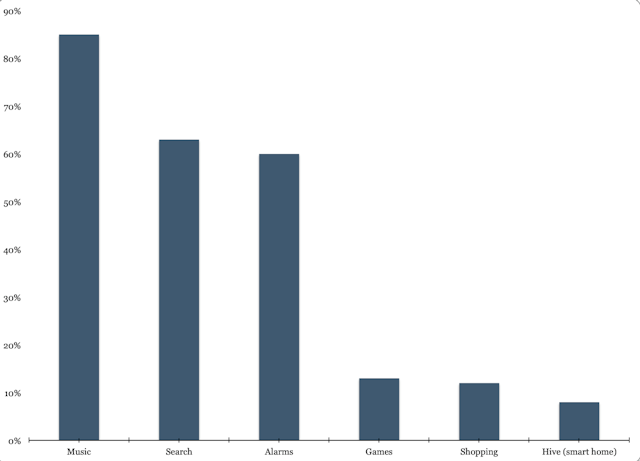The case for smart speakers being overhyped
At this year’s Consumer Electronics Show, voice was a ‘key part of every demo’, as one leading report described it. And everyone assumes that smart speakers like Amazon Echo and Google Home are booming. But are they really?

/ Photo by Andres Urena on Unsplash
If they are you’d expect everyone involved to be boasting about their success. You’d expect huge sales of smart speakers. You’d expect Amazon, Google and the other platform providers to be sharing huge levels of use. And you’d expect partners who provide services via smart speakers (‘skills’ in Amazon-speak) to be boasting about huge usage.
Lots of people are buying smart speakers…
Sales are up – so more and more people own a smart speaker like the Amazon Echo. Twice as many UK households had a smart speaker in 2018 as 2017 (13% vs 7%). Globally Amazon has sold 100m smart speakers. But are people using them?
It seems that people mainly use smart speakers as talking radios and alarm clocks.
YouGov data, gathered in January 2019, shows that the most common uses of smart speakers in the UK are:
- 85% Playing music - chosen as the most important feature by more than half of smart speaker owners.
- 63% Asking general questions.
- 60% Setting alarms.
Then there’s a sharp drop off. Only 13% play games, and just 12% order products. 8% use Hive through their smart speaker, in other words to control their smart home.
Common uses of smart speakers

Nielsen reports similar figures for the USA.
All of these are useful features. But they don’t imply a fundamental change in people’s behaviour.
Using a smart speaker for an hour a day isn’t much when you compare it to adults listening to radio for 3 hours a day.
It’s a good argument for thinking about modernising radio advertising, as James Whatley has suggested. If you can target radio listeners differently, then you’ll probably want to change your advertising.
So smart speakers don’t seem to be revolutionising what we do, measured by how long we use them for.
Might there be some niche uses, that only take up a few minutes a day? After all ordering on Amazon doesn’t take long, so maybe smart speakers are quietly revolutionising retail?
Amazon and Google don’t claim that smart speaker use is booming
The major providers of voice (Amazon, Google, Apple etc.) don't provide estimates of the amount that people use voice.
Read their annual reports and listen to their investor calls and they are very careful to be vague about the use of voice.
On investor calls, Google chief executive Sundar Pichai says that ‘it’s early days’ and it is ‘just getting started’. Google’s only public comment on home devices is that 16m recipes were cooked using Google Home over the 2018 Christmas holidays.
It’s similar for the other smart speaker makers. There’s a big gap between their PR efforts, and their legally regulated statements to investors. This should ring alarm bells.
So maybe it’s not revolutionary for Amazon or Google yet. But could smart speakers be revolutionary in some niches? All smart speakers allow third parties to provide services. Maybe these are booming?
What do the key partners say?
Companies as diverse as H&M, Starbucks and Just Eat have released smart speaker integrations in recent years. However there is very little evidence that many people are using them.
A review of 42 investor documents, across nine leading Alexa integrations, brings up plenty of mentions of integrations being launched. But not a single company reported meaningful figures for smart speaker use after launch.
When approached, none of these companies were willing to provide figures showing that their integrations were successful. Neither was Amazon. Most have said nothing at all, beyond noting the launch of a smart speaker integration.
For instance Starbucks, when reviewing its digital ecosystem at a recent investor conference, didn’t even mention its Echo skills. Voice ordering wasn’t mentioned once, even when digital relationships, such as mobile ordering, are commonly discussed in some depth (see below for an example).
Starbucks' digital priorities don’t include voice

Just Eat was a launch partner for Amazon Alexa, and picked out its partnership as part of its 2016 relaunch. But it has never revealed any figures for how many people actually use its integration. By contrast, Just Eat has revealed that over 1,000 meals have been delivered by robot.
H&M announced a ‘Home voice stylist’ for Google Assistant in June 2018, but has made no announcement on the number of users. Similarly Spotify, Argos, Centrica and Philips have all launched integrations, without reporting levels of use.
Amazon has also made no meaningful statements to investors. But it did release a PR story at Christmas 2018. An estimate based on Amazon's figures is that at Christmas 2018 30m US households had Amazon devices. Combine this with its press release and on average these households:
a) Listened to three hours of music.
b) Set three timers.
c) Did everything else mentioned in the press release less than once.
Meaningful context is entirely missing from Amazon’s other numbers. Amazon says, for instance, that 'hundreds of thousands' of cocktails were mixed over Christmas. Realistically this is less than 1% of its users mixing a cocktail this way.
Amazon also says that customers have interacted with Alexa integrations ’billions’ of times. Again this sounds impressive, but doesn’t amount to any more than a few times for every device in use.
So either use of Amazon devices is restricted to the simple uses like music, or Amazon isn’t releasing the numbers for some other reason.
Are smart speakers overhyped?
So there’s lots of evidence that people are buying smart speakers. And quite a lot of evidence that they are using them for simple tasks like music, radio and timers.
But there is no evidence at all that they are revolutionising many industries. None from the speaker makers like Amazon, none from the partners like Starbucks, and no consumer research either. No single company is boasting about the successful of its smart speaker integration.
So if you want a candidate for most over-hyped technology of 2019, voice would be an early contender.
And if you seen anything that combines voice, Elon Musk and blockchain, run.
Rob Blackie is founder of Rob Blackie Digital Strategy. He tweets @robblackie_oo
